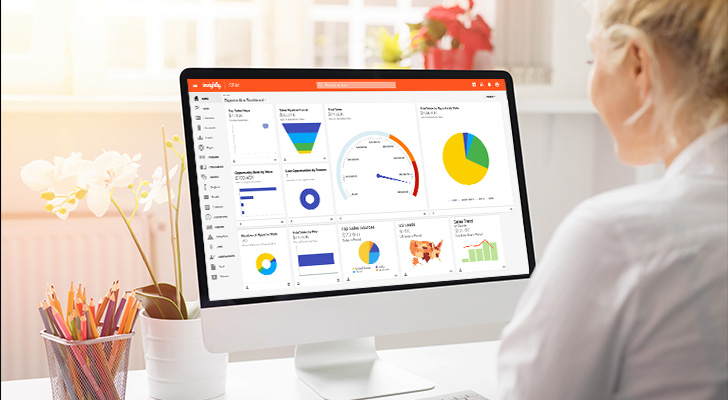Organizations across industries can benefit from the feature-rich functionality that a customer relationship management (CRM) system can provide. While they have much to offer, a clear and defined strategy is necessary to ensure the tool adds maximum value to your business.
You need to understand why you need a CRM and how it corresponds to your business’s primary goals. In this post, you’ll learn why a CRM strategy is important, and we’ll give you five CRM objectives you can set to achieve when using the software for your business.
Why do you need a CRM strategy?
Creating a CRM strategy ensures that you get the most out of your software. It clarifies why you’re using the software and how its impact aligns with your overall business strategy and goals. Plus, a defined strategy gets your entire organization on the same page and focused on achieving the same goals.
CRM tools do a lot. They give companies a centralized platform for organizing data and communicating with customers. And they allow you to manage relationships throughout the entire customer lifecycle, spanning interactions across several multichannel touchpoints.
With this robust functionality, countless benefits are available to those who implement a CRM. Creating a CRM strategy helps you find the gap in your current systems and processes so that you use the software in the manner that will have the greatest impact on the overall health of the business.
Keep in mind that your CRM strategy will depend on the size of your business. A start-up or small business will have much different needs than those of a mid-sized business or even an enterprise. As you read through the objectives below, consider the lens of the size of your business.
5 CRM objectives you can set for your business
Now that you know the importance of developing a strategy for your CRM, let’s examine some of the most impactful objectives you can set when adopting a CRM for your business:
1. Improve the buyer’s journey
The fundamental purpose of a CRM system is to improve the customer experience. Executing on this objective is the most sure-fire way to see positive results across your business. When you make improved customer satisfaction the main goal for your CRM, all other objectives work to support this goal.
Fundamental to the customer experience is the buyer’s journey. Mapping out your current buyer’s journey as a team is a great exercise for any organization. Just by doing this activity, you’ll find opportunities for improvement – especially in the places where the journey hands off in between teams (e.g. marketing to sales, sales to customer success).
Once you have the journey mapped, you can look for more ways to offer a personalized experience. A CRM gives you unified customer profiles to understand all of your customers’ needs. You can use these insights to tailor every interaction and how you approach your products and services.
With a CRM, all your customer data is easily accessible by the entire team so everyone can pick up on customers’ histories and preferences faster. This helps you increase the speed at which you respond to customer inquiries to provide a more positive experience.
By sharing data rather than siloing it, you’ll empower all teams – sales, customer success, product, and marketing – with information that helps them better perform their roles.
A recent study on building better customer experiences by Ascend2 and Insightly noted that using data and aligning departments were among the top concerns of nearly a third of respondents (32%). The data in your CRM is the exact data that teams are craving.
2. Improve operational efficiency

CRM software makes your sales process much more efficient as you can save a considerable amount of time by automating repetitive administrative tasks. Audience segmentation, email follow-ups, post-sale workflows, and invoicing are just some of the tasks and processes that a CRM lets you automate.
The simple task of automating a workflow can save time and eliminate user error. For instance, when a deal is marked closed/won, your CRM can automatically alert the entire company with a Slack message, can create tasks for your implementation team to set up and intro call, and can inform accounting to send an invoice. When these simple, repeatable tasks are taken off the plates of your team, they can focus on getting real results, like closing more deals.
Modern CRMs can further consolidate customer information gathered across the organization, including sales, marketing, and customer service, into a single dashboard, everyone in your business can enjoy streamlined communication and smoother collaboration.
3. Increase customer retention
Your best customers are always your current customers. No matter your industry, it is always easier to encourage repeat purchases and/or expand contracts than it is to win over new prospects. Per Forbes, it still costs 5x more to create a new customer than to retain a current one. Moreover, a recent report in the Harvard Business Review states that increasing customer retention rates by 5& increases profits by 25-95%…yes – 95%! By adopting a CRM, you can boost retention to maximize the average lifetime value of your customers.
The software makes it easy to track each customer’s interests and every interaction to gain a clear understanding of how to serve them best. As a result, campaigns can be aligned to each customer to encourage further loyalty.
For example, you can cross-sell and offer discounts based on previous purchases. Or, you could keep track of how long someone has been a customer and send them rewards when they reach key milestones to improve stickiness.
4. Lower your customer acquisition cost
Gaining new customers comes at a cost. With a CRM, you can get more return from every dollar spent on marketing to new customers to lower your average customer acquisition cost (CAC). There are several ways a CRM helps you achieve this.
To start, it can lower the cost needed to executive effective campaigns by automating repetitive tasks to free up time for your sales and marketing teams. The centralization of data afforded by a CRM also allows you to target potential customers with greater efficiency. Looking at behavioral patterns of your leads can help you be predictive in knowing what signals indicate a purchase is imminent – whether it be a visit to a specific webpage, opening of an email, or attendance at a webinar or other virtual event.
With a CRM, you will know exactly what stage of the purchasing process each prospect is in. You can use this to send marketing messages targeting their specific needs at that moment instead of sending generalized messages less likely to capture their attention.
5. Generate more sales

At the end of the day, your business needs sales to survive. A great way to increase sales is to ensure you direct your efforts toward selling to the right people. Not every lead will be a good fit for your business, and some will have a higher value than others. With a CRM, your sales team can ensure their pipeline is full of highly qualified leads and prospects.
The data in a CRM system can be used to learn what your best customers have in common so that you can then prioritize the leads that share the same traits. These could be job role, industry, geographical location, size of company in terms of people, revenue or both, etc.This keeps the sales team focused on the best leads for the largest contract sizes. By doing so, you can close more deals with higher-value customers.
Beyond this strategic lens, there is the sheer fact that having all of the data about your business organized and in one place will improve your sales process significantly. You’ll spend less time chasing down information, wondering about what stage a deal is in, and know the status of leads. It should be an objective to make your CRM the single source of truth. Some use the phrase “if it’s not in the CRM, it didn’t happen.” Bonuses (and even penalties) can be arranged for those who do not follow this mantra.
How to measure your CRM objectives
Goals that you can’t track and measure aren’t real goals. Therefore, every CRM objective should be tied to a specific performance metric that can be used to determine whether the objective is achieved.
If your CRM objectives align with your business goals, the appropriate metrics for evaluating your efforts should be easy to define. For example, if you want to improve customer retention, you should focus on your churn rate and look for it to decrease. Or, if you hope to increase sales, you can track new and total revenue generated.
In short, since your CRM is the heart of your business, the metrics of success around your CRM objectives and your CRM strategy should match those of your overall organization.
If you find that you’re not reaching your CRM objectives, you can then adjust your tactics to yield better results. We call this “figuring out where the funnel is leaking.” Perhaps you need more leads coming in at the top of your funnel. If that number is adequate, maybe , you’re not converting enough of those leads into opportunities, so you decide to change your automated email campaigns. Or maybe, you’re not retaining or upselling enough customers, so you choose to make a greater effort to understand where and when customer satisfaction is dropping.
When your CRM objectives are being achieved, you should see the following in your business:
- An effective and swift buyer’s journey
- Gains in operational efficiency in your organization
- Improve retention and upsell/decreased churn
- Reduction in CAC (Customer Acquisition Cost)
- Higher revenue
Achieve your goals with Insightly
While it’s great to ‘set it and forget it,’ that’s not practical with your CRM strategy. Your CRM strategy should be an ever-evolving process, with your objectives adapting over time as your business grows. This will be something you revisit on an annual basis if not more often. No matter your size or the results you achieve, your success will always depend on giving your customers the best possible experience.
Insightly CRM was designed to give businesses large and small the ability to create world-class experiences without unnecessary complexity.
Get started with a free trial of Insightly CRM today, or watch an on-demand demo to see how it can help you achieve your goals.
Additional helpful links
More information on this topic is available on the following pages:



